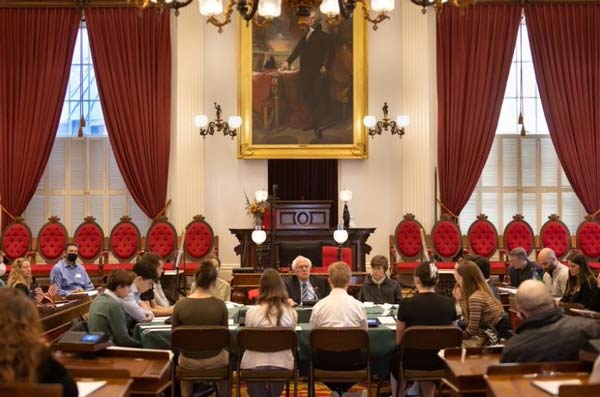By Senator Bernie Sanders, I-Vermont
Every year, for more than a decade now, I have held an annual essay contest for Vermont high school students on the “State of the Union.” The purpose is to try to get young people across our state thinking about the many issues we face as a nation, what the solutions might be, and what they would say if they were president of the United States giving the State of the Union address to the Congress and the country.
This year, nearly 400 students from 31 Vermont high schools submitted essays on many, many important issues. After the winners were chosen by an independent group of Vermont teachers, I had the opportunity to sit down with the 15 leading finalists for a round table discussion at the State House. I don’t know about them, but I had a lot of fun.
At the end of the discussion, I asked the students what they had learned. One student responded: “Government is a complicated thing.”
I couldn’t agree more.
I want to thank every student who participated in the essay contest. We should all be very proud of their efforts.
Below is the top winning essay.

First Place: August Howe, junior, Twinfield Union High School
This past Sunday, January 8, 2023, rioters stormed official capitol buildings in Brazil. The incident parallels in many ways the January 6 attack on the U.S. capitol, the two-year anniversary of which had passed just two days prior to the Brazil riot. Both events were caused, in part, by misinformation campaigns waged primarily on social media platforms. Both instances are extreme examples of what can happen when misinformation forces people into action against problems that don't exist. Both instances are proof as to why the rise of misinformation and fake news on social media is one of the major problems facing our country.
The past 25 years have seen the rise of the internet and subsequent social media platforms. Starting out as a place to connect with people on a personal level, these platforms have grown to dominate the online landscape and now serve as many people's primary source of information. They have strayed from their original purpose, developing into money generating machines that rely on user's constant engagement. Tapping into people's psychology is the main way social media platforms and those on it obtain such participation, and unfortunately, negative and emotionally-manipulating content is what gains the most attraction. As a result, social media platforms breed negativity, division, and ultimately, distorted opinions that turn into mis- and disinformation and fake news on just about every subject out there.
The solution to such a problem is complicated and far from perfect, but there are still a few options. Social media platforms are essentially news sources at this point, yet they are not held to the same legal standards. News sources are liable for the content they release, social media platforms, however, are exempt from such liability by Section 230, a law passed by the U.S. Congress that protects all providers and users of interactive computer services from liability for the content on these platforms, regardless of whether it is true or false (Electronic Frontier Foundation). Originally created to protect internet user's speech, Section 230 now enables people to exercise their freedom of speech and introduce mis- and disinformation into the media stream without consequence. By repealing Section 230 and holding social media companies responsible for the content on their platforms, we will hold them to the same standards as established news outlets, and force them to do more to stop the spread of misinformation on their platforms.
Equally as important as holding companies accountable is encouraging the education of the general public on media literacy and critical thinking skills to identify misinformation and fake news. An educated population is essential to a well-governed population, and that education must now include media literacy. Programs should be implemented in schools, starting as young as elementary students, to teach how to identify fake news and be media literate.
Regulating social media platforms like standard news outlets, and educating the general population are the best ways we can defend our country’s democracy from the threat of misinformation in social media.













